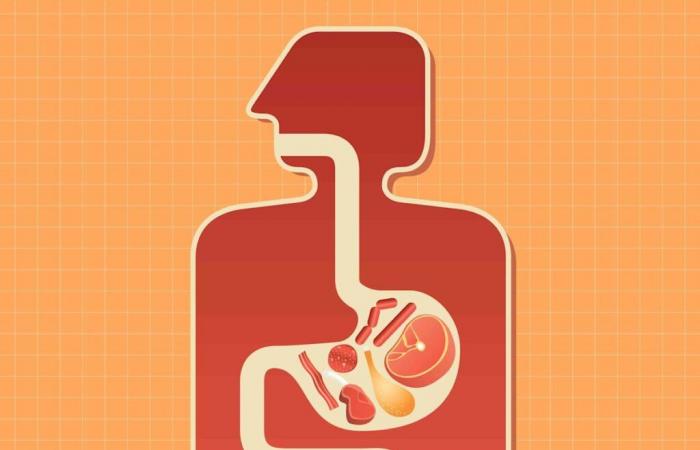Reviewed by Dietitian Maria Laura Haddad-Garcia
Design elements: Getty Images. EatingWell design.
“Key Takeaways“
-
Ocassionally consuming processed meats may be safe, if you don’t have other risk factors.
-
Gradually try substituting your daily deli meat for chicken breast or canned beans.
Just this week and last week, we saw patients as young as 16 years old [being diagnosed with Colorectal cancer],” said Pashtoon Kasi, M.D., medical director of gastrointestinal oncology at City of Hope, Orange County. “It was a challenging conversation.” Just a few years ago, this would have been an anomaly, a case study for medical journals. Now, it’s becoming disturbingly common.
Colorectal cancer was once considered a disease that primarily affected those in their 60s and beyond. Today, the rising incidence in younger populations has become so concerning that screening guidelines have shifted, recommending tests begin at age 45 instead of 50. While multiple factors likely contribute to this troubling trend, processed meat consumption increasingly appears to be a significant player in this unfolding public Health crisis.
Other factors such as environmental pollutants, genetic predisposition, sedentary lifestyle, obesity, smoking, alcohol consumption, antibiotic use, declining rates of preventive screening and chronic conditions such as type 2 diabetes and inflammatory bowel disease (IBD) play important roles. This means that the development of colorectal cancer cannot be directly attributed to processed meat consumption alone. Rather, research suggests processed meats may be a more significant contributing factor than previously understood, particularly when combined with other risk elements.
Related: Does Sugar Feed Cancer? Here’s What the Latest Science Says
How Processed Meats Are Made
Walking through a supermarket’s meat section today would be almost unrecognizable to shoppers from just a century ago. Modern processed meats undergo extensive transformations before reaching consumers.
“Processed meat is defined as meat preserved by smoking, curing or salting, or addition of chemical preservatives,” says Hannah Dalpiaz, RD, LPN, senior clinical dietitian at Dana-Farber Cancer Institute. “This includes not just bacon and hot dogs, but also sausages and pepperoni.”
She adds that frozen meatballs and chicken nuggets are considered processed foods, but the cancer risk depends on factors beyond just processing. For instance, meatballs made from red meat should also be counted within weekly red meat limits, which are 12-18 ounces of cooked meat. Additionally, smoked salmon and lox technically meet the criteria for processed meat and should be consumed sparingly, despite salmon’s health benefits, like omega-3 fatty acids.
Before modern refrigeration, curing with salt was the primary meat preservation method. While salt is still used today, modern processing introduces additional chemicals, particularly sodium nitrite and sodium nitrate, which serve as preservatives and color additives, giving products like bacon and hot dogs their characteristic pink hue.
Different processing methods create distinct carcinogenic compounds.
“Smoking produces polycyclic aromatic hydrocarbons when fat drips onto hot surfaces, creating smoke that coats the meat. Curing with sodium nitrite or nitrate converts into N-nitroso compounds during digestion, which are potent carcinogens,” says Najeeb Al Hallak, M.D., M.S., medical oncologist and co-leader of the Gastrointestinal and Neuroendocrine Oncology Multidisciplinary Team at Karmanos Cancer Institute.
Even salting plays a role. High salt content damages the mucous of the GI tract, especially the stomach, and may increase cell turnover, making it easier for carcinogens to initiate tumors, Al Hallak adds.
In 2015, after reviewing more than 800 studies, the World Health Organization’s International Agency for Research on Cancer classified processed meat as a Group 1 carcinogen, the same category as tobacco smoking and asbestos. Red meat received a Group 2A classification, meaning it’s a “probable carcinogen.”
“About 50 grams of processed meat (eaten daily) could increase the risk of colorectal cancer by about 18%,” said Kasi, referencing information released by the World Health Organization. To put this in perspective, 50 grams is approximately “a few slices of bacon or one hot dog or a few slices of deli meat or ham, depending on the thickness and brand,” he says.
The evidence is particularly strong for colorectal cancer, but research suggests associations with other cancers as well. A variety of research links the consumption of processed meats to stomach, esophageal, pancreatic, and breast cancers, notes Al Hallak.
A recent study by researchers at the University of South Florida Health and Tampa General Hospital Cancer Institute found compelling evidence of chronic inflammation in colorectal cancer tumors that appears directly related to diet.
“We found the smoking gun for inflammation in the tumors that can only relate to diet, because you only get these lipids (that seem to encourage cancer growth) from dietary sources,” says Timothy Yeatman, M.D., FACS, study author and associate center director for Translational Research and Innovation at the TGH Cancer Institute. Their research found that high lipids that cause inflammation in colorectal cancer patients also reduce the body’s natural inflammation-fighting molecules.
The Mechanisms: How Processed Meats May Cause Cancer
“At least five mechanisms link processed meats to colon cancer,” says Al Hallak. “Most processed meats contain nitrites, which are converted in the body to carcinogenic nitroso compounds, especially in the colon. These substances cause DNA damage, which can lead to tumor formation and growth.”
Heme iron in red and processed meats promotes lipid peroxidation, which, in excess, may damage colon cell membranes and DNA, potentially increasing cancer risk.
“Processed meat consumption can also alter gut microbiome, causing chronic inflammation, which is a contributor to colorectal tumor initiation and progression,” adds Al Hallak. “Studies show that meat rich in nitrites increases cell proliferation in the colon lining, which increases the likelihood of mutations.”
When asked which component of processed meat concerns him most, Al Hallak doesn’t hesitate:
“In my opinion, it is the nitrites added to processed meats to preserve color and prevent bacterial growth,” he says. “In the acidic environment of the stomach or colon, especially if heme iron is present, they can form N-nitroso compounds, such as nitrosamines and nitrosamides, which are strongly carcinogenic, especially to the lining of the colon.”
No cooking method can reduce the carcinogenic compounds in processed meats, but any method that chars the meat can further increase risk, adds Dalpiaz. When meat is cooked at high temperatures, especially through grilling, it produces additional harmful compounds.
Risk in Real Life: How Worried Should You Be?
The 18% increased risk statistic requires context. While significant on a population level, individual risk depends on multiple factors, including baseline risk, consumption frequency and lifestyle.
“The risk increases with how much you eat,” notes Al Hallak. “According to the World Health Organization, each daily hot dog or couple slices of bacon (about 50 grams of processed meat) raises your colorectal cancer risk by roughly 18%.”
But this doesn’t mean occasional consumption is automatically dangerous. Having a hot dog or bacon every few weeks likely poses minimal added risk for someone with no family history who’s otherwise healthy. However, daily processed meat consumption, especially combined with other risk factors like family history or smoking, could significantly affect your risk profile.
“While the best option is completely limiting, the risk is higher with daily consumption,” says Dalpiaz. She adds that if you generally reduce these foods but have an occasional hot dog at the ballpark, that’s probably okay. Yet, “If this is part of your more regular day-to-day consumption, that is when we want to think about if there are places to reduce or adjust,” she notes.
Beyond cancer, processed meats impact other aspects of health. Consumption of processed meats is strongly linked to several major non-cancer health conditions, including cardiovascular disease, type 2 diabetes, obesity and metabolic syndrome, chronic kidney disease, gout and hyperuricemia, and cognitive decline and dementia, says Al Hallak.
Compared to other known carcinogens like tobacco, which is linked to about 80% to 90% of lung cancer deaths, processed meat’s 18% increased risk is considerably smaller. However, unlike smoking, which is becoming less common, processed meat consumption remains widespread and is even increasing in many countries.
What Can You Do to Reduce Your Intake
The scientific consensus suggests moderation is key. Occasional consumption likely poses minimal risk for most individuals, while daily consumption significantly increases cancer risk over time. For those concerned about processed meat’s potential health effects, several strategies can help reduce risk:
-
Limit Your Consumption: “Avoid processed meats whenever possible, including deli meats, bacon, sausages, hot dogs, ham and jerky,” says Al Hallak.
-
Watch Out for “Natural” Alternatives: Be cautious with “natural” or “organic” processed meats containing naturally derived nitrites, warns Dalpiaz. ” I don’t think we can confidently say these are safer. They may not have added nitrates or nitrites, but may have similar levels of these compounds in naturally occurring forms,” she adds. “Because we can’t say with confidence that nitrates are the culprit for why processed meats are risky, I think it still comes back to moderation is key with any consumption of processed meat, no matter the type.” Instead, Dalpiaz suggests replacing processed meats with sliced turkey or chicken breast or opting for plant-based options like tofu, hummus, edamame, beans, lentils, nuts and seeds more often than not.
-
Take Gradual Steps: “I think it is always helpful to look at your current intake and look at what would be the next reasonable place to reduce. If deli meats are lunch daily, you could start by using an alternative one day a week and gradually build on that approach,” says Dalpiaz.
-
Be Thoughtful of Your Cooking Methods: Use safer cooking methods such as steaming, boiling, sous vide, or baking at low temperatures. Limit charring, grilling and frying.
-
Eat More Nutrient-Dense Foods: “Focus on protective foods, such as cruciferous vegetables, fiber-rich foods, antioxidant-rich fruits such as blueberries or citrus, and whole grains or legumes,” says Al Hallak. While an anticancer diet per se doesn’t exist at this time, research shows that including plant-based foods does have a benefit for overall cancer risk reduction. “Plant-based doesn’t negate the risk of eating processed meat, but it also doesn’t hurt to load up on vegetables when there is processed meat included at a meal,” says Dalpiaz.
The Bottom Line
The science linking processed meats to cancer risk, particularly colorectal cancer, continues to strengthen. While the reasons are complex and multifaceted, inflammation appears to be key. For those with additional risk factors, such as family history and tobacco smoking, more caution may be needed.
“I think this can be a very personal decision, but with the available information, someone with a strong family history or genetic predisposition towards colorectal cancer risk may want to be more conservative with their consumption of processed meats,” says Dalpiaz.
Related: Does Eating Organic Foods Really Lower Your Cancer Risk? Here’s What Experts Say
Read the original article on EATINGWELL






